Roman Polanski: Film's dark prince
- Published
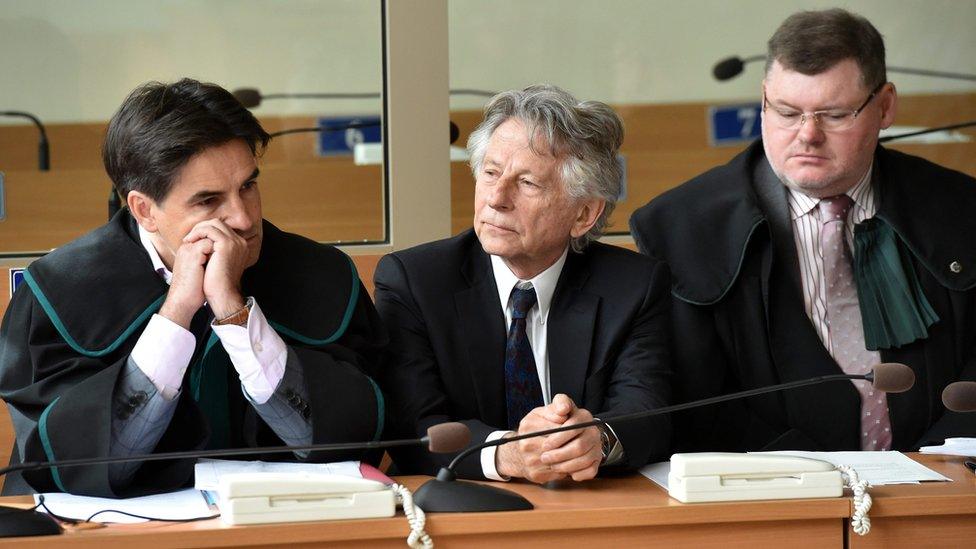
Roman Polanski was in court in Krakow for an earlier hearing
BBC News profiles legendary film director Roman Polanski.
The life of the Polish-French director has been as tortuous and full of incident and tragedy as one of his dark films.
His 2002 drama The Pianist, a story of a virtuoso's escape from a Warsaw ghetto during World War II, won the prestigious Palme D'Or award at Cannes and also the best director Oscar.
The Paris-born director had himself survived the Nazi atrocities committed in the Krakow ghetto, but lost his mother in a concentration camp gas chamber.
He went on to study at the prestigious Polish State Film College in Lodz and came to international prominence with his feature debut Knife in the Water in 1962.
A claustrophobic thriller set on a weekend yacht trip, the film angered communist officials but won the critics' prize at the Venice Film Festival.
Polanski moved to Hollywood and scored a major box office success with Rosemary's Baby.
Family tragedy
Starring Mia Farrow as a woman who dreams she has been impregnated by the devil, the tense, uneasy 1968 film heavily influenced the horror genre with its psychological tone.
Tragedy overwhelmed Polanski the following year when his heavily pregnant wife Sharon Tate was brutally murdered, along with four others, by killers acting on the orders of radical cult leader Charles Manson.
Dubbed the crime that "killed" the spirit of the 1960s by some, the murders were part of Manson's deranged efforts to start a race war in America.
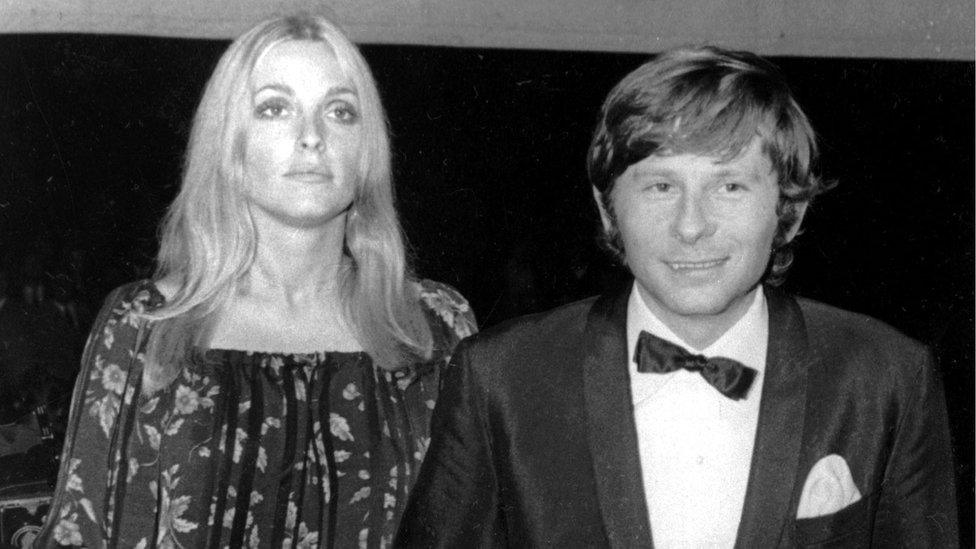
Sharon Tate was eight-and-a-half months pregnant with the couple's son, when she was murdered in her home
The traumatised Polanski left for Europe, and made his return to film with an oppressive and gloomy version of William Shakespeare's Macbeth in 1971.
He returned to Hollywood in 1974 to make Chinatown, considered by many the peak of his US film career.
Jack Nicholson played JJ Gittes, a detective in the Philip Marlowe mould, in a California-set thriller shot through with the darker aspects of predecessors like The Maltese Falcon and The Big Sleep.
Polanski gave himself a cameo as a hood who slashes Nicholson's nose.
The film was nominated in 11 other categories in the 1974 Oscars, taking home just one prize - for best original screenplay.
Jumps bail
But three years later, Polanski was plunged into controversy when he was charged with having unlawful sex with a 13-year-old girl at Jack Nicholson's house in Los Angeles.
Maintaining the girl was sexually experienced and had consented, Polanski spent 42 days in prison undergoing psychiatric tests, but chose to jump bail and flee the US in 1978 - first to Britain and then immediately to France.
The filmmaker has lived there ever since, unable to return to the US for fear of arrest and imprisonment. He even avoided making films in the UK because of the danger of extradition.
Polanski's attempts to have the case dismissed failed in 2009, when a court in Los Angeles rejected his request to have a hearing heard outside the Los Angeles court system.
He later mixed arthouse projects like 1992's Bitter Moon featuring Hugh Grant and 1994's Death and the Maiden, with Hollywood-friendly films.
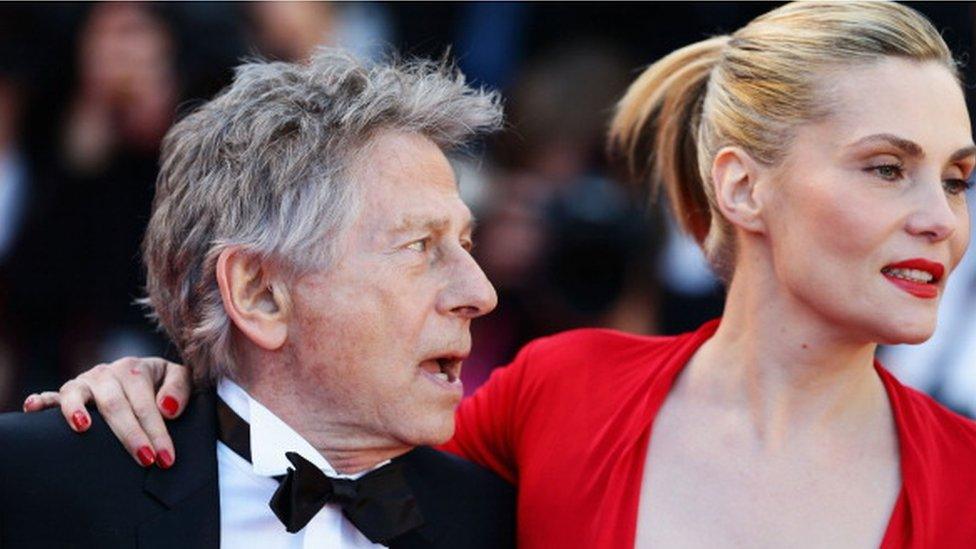
Polanski and his wife, Emmanuelle Seigner, have been married 26 years
Return to form
He made the Harrison Ford-vehicle Frantic in 1988, and in 1999 the supernatural thriller Ninth Gate, which featured Johnny Depp.
Polanski's decision to direct The Pianist caused much debate, as the story of musician Wladyslaw Szpilman paralleled Polanski's own wartime experiences.
But for many critics, the film - which starred best actor Oscar-winner Adrien Brody as Szpilman - heralded a long-overdue return to form.
In the ultimate showbiz accolade, the film won the best director Oscar for Polanski at the 2003 Academy Awards. Harrison Ford collected the statue on Polanski's behalf.
In 2005, he directed Oliver Twist, a film which he felt mirrored his own life as a young boy having to fend for himself in World War II Poland.
Four years later, Polanski was due to be awarded a life-time achievement award at Zurich Film Festival but he was arrested by Swiss police at the request of US authorities, on a decades-old warrant.
He was allowed to remain in Switzerland, living under house arrest, after posting $4.5m (£2.9m) bail.
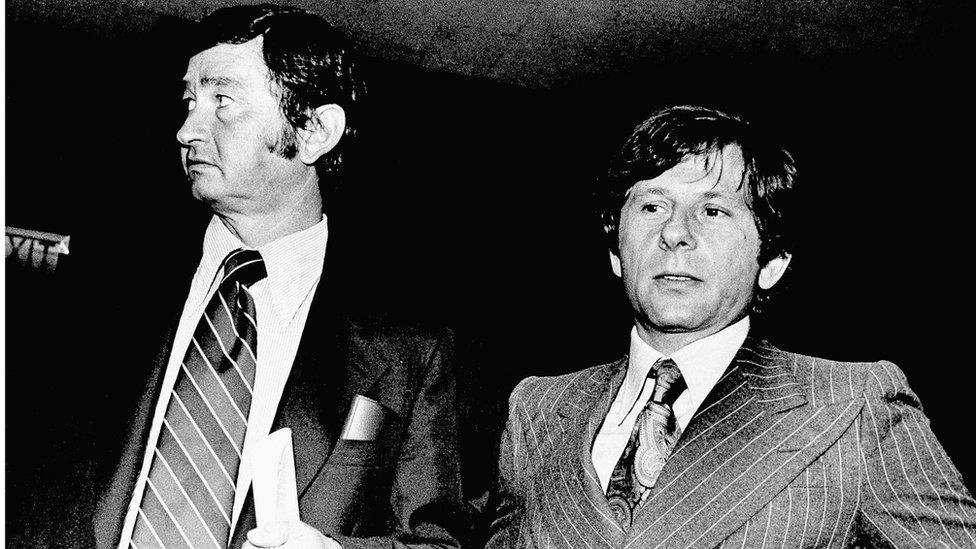
The director (right) was 44 when he pled guilty to unlawful sex with a 13-year-old in California
He was freed after nine months, but production was delayed on his next film, 2010's political thriller The Ghost Writer, starring Ewan McGregor and Pierce Brosnan.
It went on to win six awards at the European Film Awards in 2010, including best director, and Polanski won the Silver Bear for best director after the film made its debut at the 60th Berlinale.
In 2011, Polanski made Carnage, based on Yasmina Reza's play Gods of Carnage. It starred Christoph Waltz, Kate Winslet and Jodie Foster, telling the story of two couples whose children get into a fight at school and the chaos that ensues.
He premiered Venus in Fur at the 2013 Cannes Film Festival, which starred his wife, Emmanuelle Seigner.
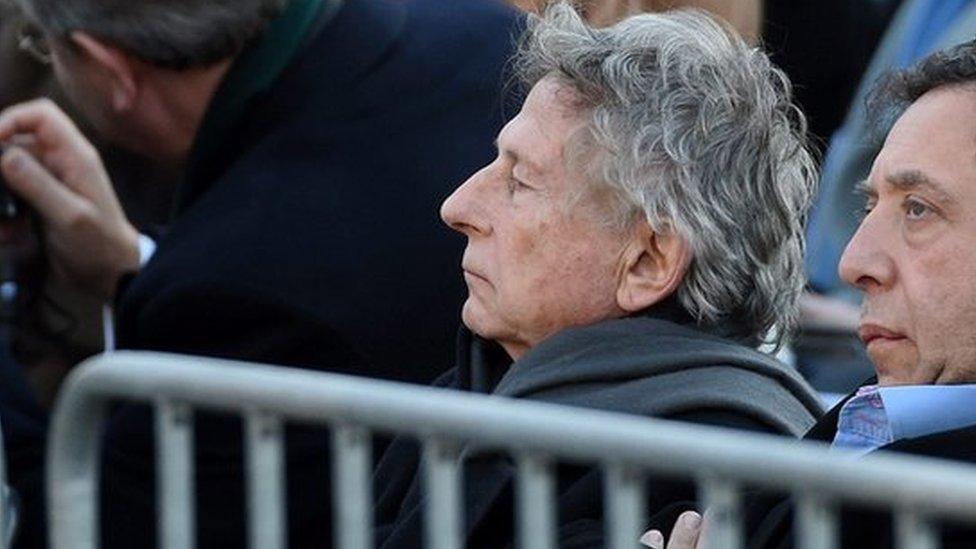
An advisor to the Polish President accused the US of "absolute ignorance" in seeking to arrest Polanski at the opening of a Jewish history museum.
In 2014, the United States requested Polanski's extradition from Poland after he made a high-profile appearance at the opening of a Jewish museum in Warsaw, Poland.
He was questioned by Polish prosecutors, acting on a US request and agreed to comply with the Polish justice system as it examined the matter.
The next chapter in Polanski's saga played out in October 2015 when a court in Krakow ruled against a US request to extradite the now 82-year-old film director.
Judge Dariusz Mazur said the request was "inadmissible".
The decision is not legally binding, as prosecutors can now appeal the ruling, and so the saga continues.